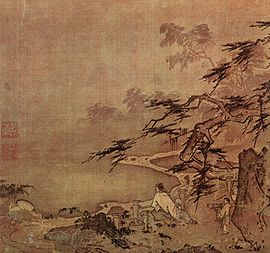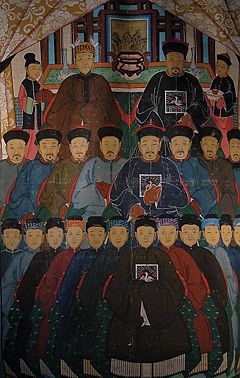
Gentry (China)
Encyclopedia

China
Chinese civilization may refer to:* China for more general discussion of the country.* Chinese culture* Greater China, the transnational community of ethnic Chinese.* History of China* Sinosphere, the area historically affected by Chinese culture...
, landed gentry
Landed gentry
Landed gentry is a traditional British social class, consisting of land owners who could live entirely off rental income. Often they worked only in an administrative capacity looking after the management of their own lands....
does not correspond to any term in Chinese. One standard work remarks that under the Ming dynasty
Ming Dynasty
The Ming Dynasty, also Empire of the Great Ming, was the ruling dynasty of China from 1368 to 1644, following the collapse of the Mongol-led Yuan Dynasty. The Ming, "one of the greatest eras of orderly government and social stability in human history", was the last dynasty in China ruled by ethnic...
, called shenshi or shenjin, meaning variously degree-holders, literati, scholar-bureaucrats
Scholar-bureaucrats
Scholar-officials or Scholar-bureaucrats were civil servants appointed by the emperor of China to perform day-to-day governance from the Sui Dynasty to the end of the Qing Dynasty in 1912, China's last imperial dynasty. These officials mostly came from the well-educated men known as the...
or officials, they are loosely known in English as the Chinese gentry." Attempts have been made to define them as the class, mostly landowners, who had passed the examinations and so were eligible to hold office, were retired mandarins or their families and descendants. Their power and influence eclipsed that of the hereditary and largely military aristocrats
Chinese nobility
Chinese sovereignty and peerage, the nobility of China, were an important feature of traditional social and political organization of Imperial China. While the concepts of hereditary sovereign and peerage titles and noble families were featured as early as the semi-mythical, early historical...
after the Tang
Tang Dynasty
The Tang Dynasty was an imperial dynasty of China preceded by the Sui Dynasty and followed by the Five Dynasties and Ten Kingdoms Period. It was founded by the Li family, who seized power during the decline and collapse of the Sui Empire...
dynasty, for by the Song Dynasty
Song Dynasty
The Song Dynasty was a ruling dynasty in China between 960 and 1279; it succeeded the Five Dynasties and Ten Kingdoms Period, and was followed by the Yuan Dynasty. It was the first government in world history to issue banknotes or paper money, and the first Chinese government to establish a...
the civil service exam
Imperial examination
The Imperial examination was an examination system in Imperial China designed to select the best administrative officials for the state's bureaucracy. This system had a huge influence on both society and culture in Imperial China and was directly responsible for the creation of a class of...
replaced the nine-rank system
Nine-rank system
The nine rank system , or much less commonly nine grade controller system, was a civil service nomination system during the Three Kingdoms and the Southern and Northern Dynasties in China...
which favored nobles.
Under the Confucian
Confucianism
Confucianism is a Chinese ethical and philosophical system developed from the teachings of the Chinese philosopher Confucius . Confucianism originated as an "ethical-sociopolitical teaching" during the Spring and Autumn Period, but later developed metaphysical and cosmological elements in the Han...
class system (the four occupations
Four occupations
The four occupations or "four categories of the people" was a hierarchic social class structure developed in ancient China by either Confucian or Legalist scholars as far back as the late Zhou Dynasty and is considered a central part of the Fengjian social structure...
) the scholar-official was at the top with farmers, artisans, and merchants below them in descending order. Since the next highest class was agricultural, scholar-officials retired to landed estates. They did not work the land themselves but hired peasants as tenant farmers. In this period of Chinese history, peasants were actually of a higher class than the merchants. The sons of these mandarins aspired to pass the imperial exams
Imperial examination
The Imperial examination was an examination system in Imperial China designed to select the best administrative officials for the state's bureaucracy. This system had a huge influence on both society and culture in Imperial China and was directly responsible for the creation of a class of...
and continue the family legacy. Members of the gentry were expected to be an example to their community as Confucian gentlemen.
By late imperial China
Late Imperial China
Late Imperial China refers to the period between the end of Mongol rule in 1368 and the establishment of the Republic of China in 1912 and includes the Ming and Qing Dynasties...
, sons of merchants used their money to buy an education and enter the civil service
Civil service
The term civil service has two distinct meanings:* A branch of governmental service in which individuals are employed on the basis of professional merit as proven by competitive examinations....
. Also, financially desperate gentry married into merchant families which led to a breakdown of the old class structure. With the abolition of the exam system and the overthrow of the Qing dynasty
Qing Dynasty
The Qing Dynasty was the last dynasty of China, ruling from 1644 to 1912 with a brief, abortive restoration in 1917. It was preceded by the Ming Dynasty and followed by the Republic of China....
came the end of the scholar-bureaucrat.

New Culture Movement
The New Culture Movement of the mid 1910s and 1920s sprang from the disillusionment with traditional Chinese culture following the failure of the Chinese Republic, founded in 1912 to address China’s problems. Scholars like Chen Duxiu, Cai Yuanpei, Li Dazhao, Lu Xun, Zhou Zuoren, and Hu Shi, had...
, radicals used the term to criticize land owners as feudal. Mao Zedong
Mao Zedong
Mao Zedong, also transliterated as Mao Tse-tung , and commonly referred to as Chairman Mao , was a Chinese Communist revolutionary, guerrilla warfare strategist, Marxist political philosopher, and leader of the Chinese Revolution...
led the way in attacking "bad gentry and local bullies" for demanding and collecting high rent from their tenants during the republican period
History of the Republic of China
The History of the Republic of China begins after the Qing Dynasty in 1912, when the formation of the Republic of China put an end to over two thousand years of Imperial rule. The Qing Dynasty, also known as the Manchu Dynasty, ruled from 1644 to 1912...
, and indeed many organized violent gangs to enforce their rule. The communists were able to rally much of the village population through their promises of agrarian reform and land redistribution. After the People's Republic of China
People's Republic of China
China , officially the People's Republic of China , is the most populous country in the world, with over 1.3 billion citizens. Located in East Asia, the country covers approximately 9.6 million square kilometres...
was established, many landlords were executed by class struggle
Class struggle
Class struggle is the active expression of a class conflict looked at from any kind of socialist perspective. Karl Marx and Friedrich Engels wrote "The [written] history of all hitherto existing society is the history of class struggle"....
trials and the class as a whole was abolished. Former members were stigmatized and faced persecution which reached its heights during the Cultural Revolution
Cultural Revolution
The Great Proletarian Cultural Revolution, commonly known as the Cultural Revolution , was a socio-political movement that took place in the People's Republic of China from 1966 through 1976...
. This persecution ended with the advent of Chinese economic reform
Chinese economic reform
The Chinese economic reform refers to the program of economic reforms called "Socialism with Chinese characteristics" in the People's Republic of China that were started in December 1978 by reformists within the Communist Party of China led by Deng Xiaoping.China had one of the world's largest...
under Deng Xiaoping
Deng Xiaoping
Deng Xiaoping was a Chinese politician, statesman, and diplomat. As leader of the Communist Party of China, Deng was a reformer who led China towards a market economy...
.

